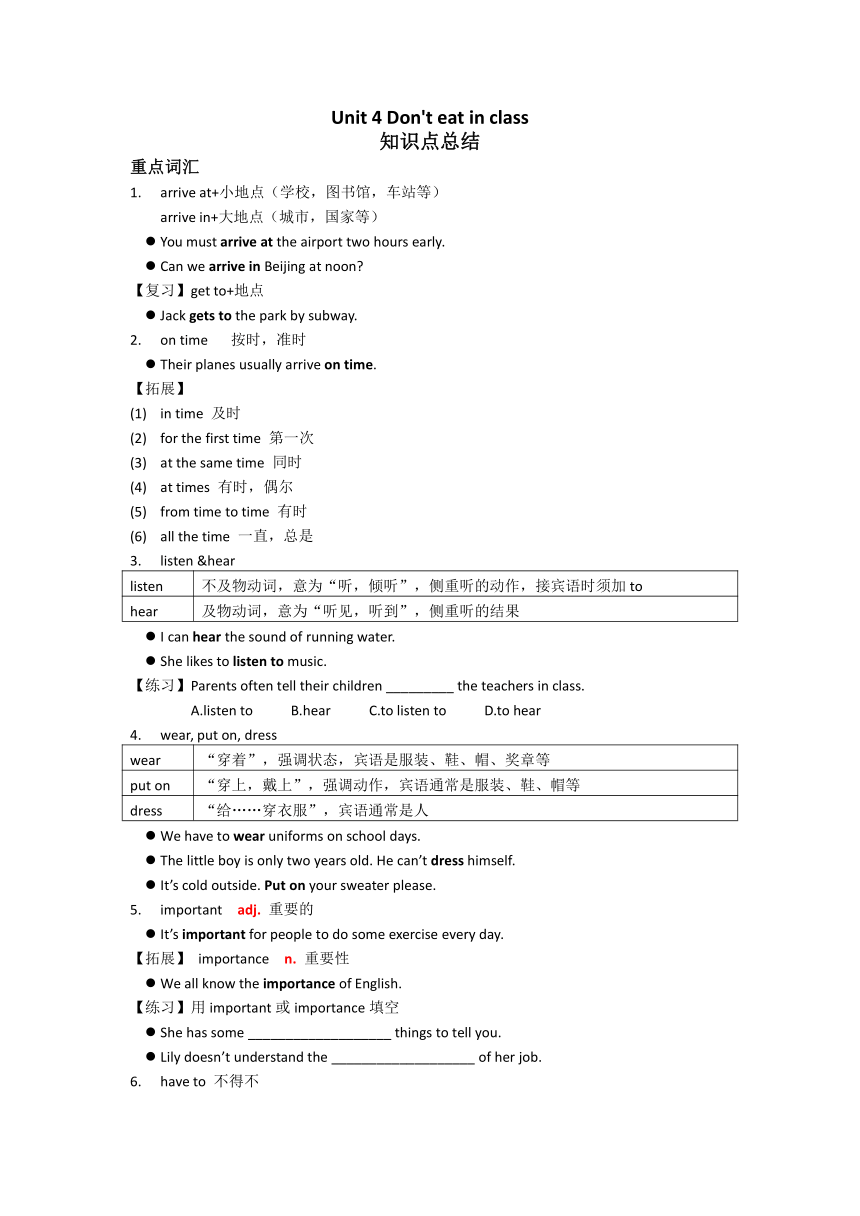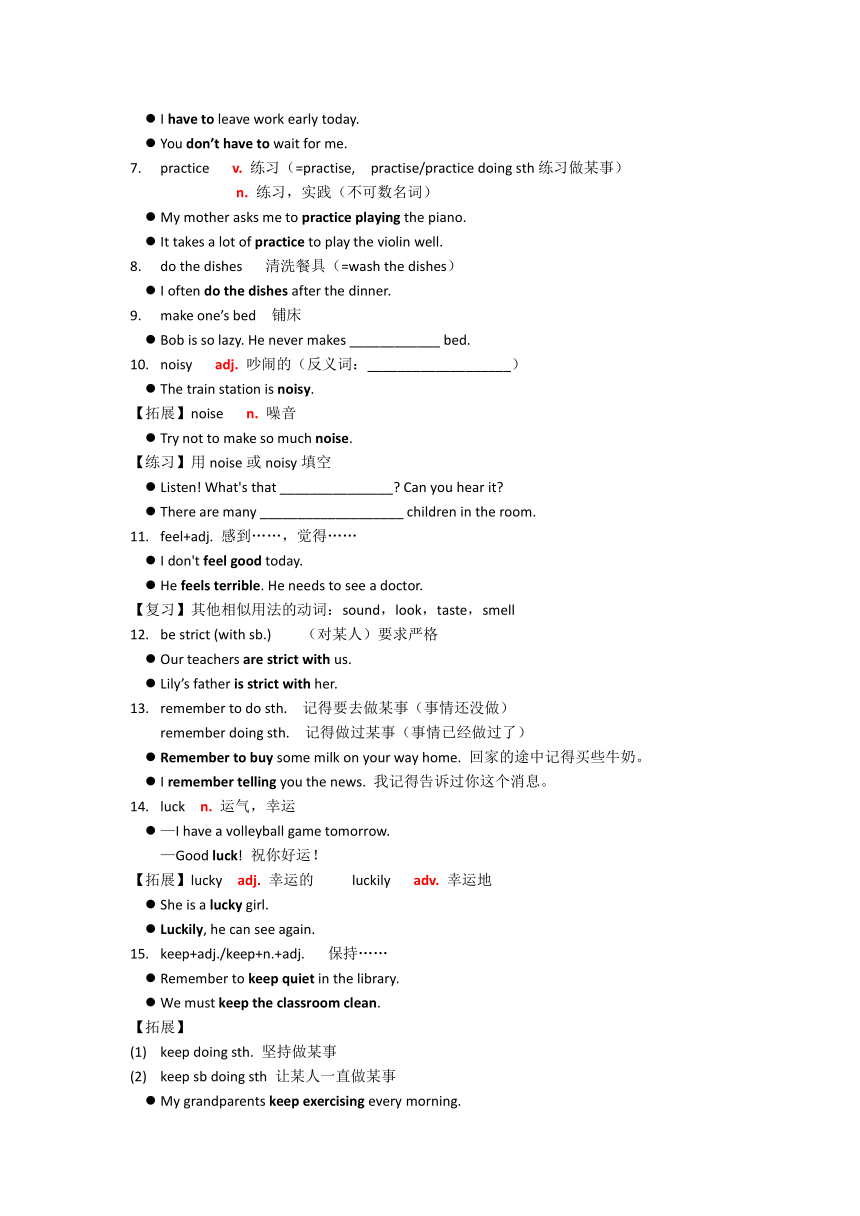人教版七年级下册Unit 4 Don't eat in class.知识点总结
文档属性
| 名称 | 人教版七年级下册Unit 4 Don't eat in class.知识点总结 |

|
|
| 格式 | docx | ||
| 文件大小 | 25.1KB | ||
| 资源类型 | 教案 | ||
| 版本资源 | 人教新目标(Go for it)版 | ||
| 科目 | 英语 | ||
| 更新时间 | 2024-04-19 15:17:12 | ||
图片预览


文档简介
Unit 4 Don't eat in class
知识点总结
重点词汇
arrive at+小地点(学校,图书馆,车站等)
arrive in+大地点(城市,国家等)
You must arrive at the airport two hours early.
Can we arrive in Beijing at noon
【复习】get to+地点
Jack gets to the park by subway.
on time 按时,准时
Their planes usually arrive on time.
【拓展】
in time 及时
for the first time 第一次
at the same time 同时
at times 有时,偶尔
from time to time 有时
all the time 一直,总是
listen &hear
listen 不及物动词,意为“听,倾听”,侧重听的动作,接宾语时须加to
hear 及物动词,意为“听见,听到”,侧重听的结果
I can hear the sound of running water.
She likes to listen to music.
【练习】Parents often tell their children _________ the teachers in class.
A.listen to B.hear C.to listen to D.to hear
wear, put on, dress
wear “穿着”,强调状态,宾语是服装、鞋、帽、奖章等
put on “穿上,戴上”,强调动作,宾语通常是服装、鞋、帽等
dress “给……穿衣服”,宾语通常是人
We have to wear uniforms on school days.
The little boy is only two years old. He can’t dress himself.
It’s cold outside. Put on your sweater please.
important adj. 重要的
It’s important for people to do some exercise every day.
【拓展】 importance n. 重要性
We all know the importance of English.
【练习】用important或importance填空
She has some ___________________ things to tell you.
Lily doesn’t understand the ___________________ of her job.
have to 不得不
I have to leave work early today.
You don’t have to wait for me.
practice v. 练习(=practise, practise/practice doing sth练习做某事)
n. 练习,实践(不可数名词)
My mother asks me to practice playing the piano.
It takes a lot of practice to play the violin well.
do the dishes 清洗餐具(=wash the dishes)
I often do the dishes after the dinner.
make one’s bed 铺床
Bob is so lazy. He never makes ____________ bed.
noisy adj. 吵闹的(反义词:___________________)
The train station is noisy.
【拓展】noise n. 噪音
Try not to make so much noise.
【练习】用noise或noisy填空
Listen! What's that _______________ Can you hear it
There are many ___________________ children in the room.
feel+adj. 感到……,觉得……
I don't feel good today.
He feels terrible. He needs to see a doctor.
【复习】其他相似用法的动词:sound,look,taste,smell
be strict (with sb.) (对某人)要求严格
Our teachers are strict with us.
Lily’s father is strict with her.
remember to do sth. 记得要去做某事(事情还没做)
remember doing sth. 记得做过某事(事情已经做过了)
Remember to buy some milk on your way home. 回家的途中记得买些牛奶。
I remember telling you the news. 我记得告诉过你这个消息。
luck n. 运气,幸运
—I have a volleyball game tomorrow.
—Good luck! 祝你好运!
【拓展】lucky adj. 幸运的 luckily adv. 幸运地
She is a lucky girl.
Luckily, he can see again.
keep+adj./keep+n.+adj. 保持……
Remember to keep quiet in the library.
We must keep the classroom clean.
【拓展】
keep doing sth. 坚持做某事
keep sb doing sth 让某人一直做某事
My grandparents keep exercising every morning.
I’m sorry to keep you waiting.
【练习】用所给词的适当形式填空:
How can we keep __________________(health)
He is tired so he doesn’t want to keep ________________(work).
learn to do sth 学习做某事
Students can learn to cook at school.
【拓展】
learn about 了解
learn (sth) from sb 向某人学习(某事)
Janet wants to learn about China.
Let’s learn from the great scientists, like Yuan Longping, Zhong Nanshan and Qian Xuesen.
in class 在课堂上,上课时
in the class 在班里
Listen to your teacher in class.
Is Lucy the best in the class
some of... ……中的一些
There are 20 apples on the table. Some of them are red.
Here are some of my photos.
Some of the beef goes bad.
bring...to.... 把……带到……
Don’t bring your smart phones to school.
【辨析】bring, take, get
bring “带来”,强调将某人或某物从别的地方带到说话者所在的地方来
take “带走,拿走”,强调从说话者所在的地方将某人或某物带到别的地方去
get “去拿,去取”,离开说话者所在的地方去取某物后咋回来,强调动作的往返
It’s raining now. Take an umbrella with you when you go out.
I’m thirsty. Please get me some water.
Remember to bring your homework to school tomorrow.
go out 外出
Cindy can’t go out on school nights.
【拓展】eat out 出去吃饭
It's a good idea to eat out once a while.
help sb (to) do sth. 帮助某人做某事
Can you help me (to) clean my room
【拓展】help sb with sth 在某方面帮助某人
My brother always helps me with my maths.
The girl sometimes helps her mother with housework.
too many, too much,much too
too many “太多”,修饰可数名词复数形式
too much “太多”,修饰不可数名词或动词
much too “太”,后接形容词或副词
Drinking too much wine is bad for your health.
The shoes are much too big for me.
There are too many rules in my family.
think about 考虑
Give me a few hours to think about it.
make rules 制定规则
Parents and teachers are strict, but I know they make rules to help us.
have fun doing sth 做某事很开心
I have fun playing chess with my uncle.
单元语法:祈使句
概述:祈使句用于表示命令、请求、要求、劝告、建议、警告、禁止等。其主语是you,常省略。
基本结构
类型 句型 例句
Do型 肯定形式:动词原形(+其他). Come here.
否定形式:Don't+动词原形(+其他). Don’t talk.
Be型 肯定形式:Be+表语(+其他). Be careful.
否定形式:Don't+be+表语(+其他). Don’t be careless.
Let型 肯定形式:Let+宾语+动词原形(+其他). Let me tell you a story.
否定形式: Don't+let+宾语+动词原形(+其他). Let+宾语+not++动词原形(+其他). Don’t let him play computer games. Let him not play computer games.
知识点总结
重点词汇
arrive at+小地点(学校,图书馆,车站等)
arrive in+大地点(城市,国家等)
You must arrive at the airport two hours early.
Can we arrive in Beijing at noon
【复习】get to+地点
Jack gets to the park by subway.
on time 按时,准时
Their planes usually arrive on time.
【拓展】
in time 及时
for the first time 第一次
at the same time 同时
at times 有时,偶尔
from time to time 有时
all the time 一直,总是
listen &hear
listen 不及物动词,意为“听,倾听”,侧重听的动作,接宾语时须加to
hear 及物动词,意为“听见,听到”,侧重听的结果
I can hear the sound of running water.
She likes to listen to music.
【练习】Parents often tell their children _________ the teachers in class.
A.listen to B.hear C.to listen to D.to hear
wear, put on, dress
wear “穿着”,强调状态,宾语是服装、鞋、帽、奖章等
put on “穿上,戴上”,强调动作,宾语通常是服装、鞋、帽等
dress “给……穿衣服”,宾语通常是人
We have to wear uniforms on school days.
The little boy is only two years old. He can’t dress himself.
It’s cold outside. Put on your sweater please.
important adj. 重要的
It’s important for people to do some exercise every day.
【拓展】 importance n. 重要性
We all know the importance of English.
【练习】用important或importance填空
She has some ___________________ things to tell you.
Lily doesn’t understand the ___________________ of her job.
have to 不得不
I have to leave work early today.
You don’t have to wait for me.
practice v. 练习(=practise, practise/practice doing sth练习做某事)
n. 练习,实践(不可数名词)
My mother asks me to practice playing the piano.
It takes a lot of practice to play the violin well.
do the dishes 清洗餐具(=wash the dishes)
I often do the dishes after the dinner.
make one’s bed 铺床
Bob is so lazy. He never makes ____________ bed.
noisy adj. 吵闹的(反义词:___________________)
The train station is noisy.
【拓展】noise n. 噪音
Try not to make so much noise.
【练习】用noise或noisy填空
Listen! What's that _______________ Can you hear it
There are many ___________________ children in the room.
feel+adj. 感到……,觉得……
I don't feel good today.
He feels terrible. He needs to see a doctor.
【复习】其他相似用法的动词:sound,look,taste,smell
be strict (with sb.) (对某人)要求严格
Our teachers are strict with us.
Lily’s father is strict with her.
remember to do sth. 记得要去做某事(事情还没做)
remember doing sth. 记得做过某事(事情已经做过了)
Remember to buy some milk on your way home. 回家的途中记得买些牛奶。
I remember telling you the news. 我记得告诉过你这个消息。
luck n. 运气,幸运
—I have a volleyball game tomorrow.
—Good luck! 祝你好运!
【拓展】lucky adj. 幸运的 luckily adv. 幸运地
She is a lucky girl.
Luckily, he can see again.
keep+adj./keep+n.+adj. 保持……
Remember to keep quiet in the library.
We must keep the classroom clean.
【拓展】
keep doing sth. 坚持做某事
keep sb doing sth 让某人一直做某事
My grandparents keep exercising every morning.
I’m sorry to keep you waiting.
【练习】用所给词的适当形式填空:
How can we keep __________________(health)
He is tired so he doesn’t want to keep ________________(work).
learn to do sth 学习做某事
Students can learn to cook at school.
【拓展】
learn about 了解
learn (sth) from sb 向某人学习(某事)
Janet wants to learn about China.
Let’s learn from the great scientists, like Yuan Longping, Zhong Nanshan and Qian Xuesen.
in class 在课堂上,上课时
in the class 在班里
Listen to your teacher in class.
Is Lucy the best in the class
some of... ……中的一些
There are 20 apples on the table. Some of them are red.
Here are some of my photos.
Some of the beef goes bad.
bring...to.... 把……带到……
Don’t bring your smart phones to school.
【辨析】bring, take, get
bring “带来”,强调将某人或某物从别的地方带到说话者所在的地方来
take “带走,拿走”,强调从说话者所在的地方将某人或某物带到别的地方去
get “去拿,去取”,离开说话者所在的地方去取某物后咋回来,强调动作的往返
It’s raining now. Take an umbrella with you when you go out.
I’m thirsty. Please get me some water.
Remember to bring your homework to school tomorrow.
go out 外出
Cindy can’t go out on school nights.
【拓展】eat out 出去吃饭
It's a good idea to eat out once a while.
help sb (to) do sth. 帮助某人做某事
Can you help me (to) clean my room
【拓展】help sb with sth 在某方面帮助某人
My brother always helps me with my maths.
The girl sometimes helps her mother with housework.
too many, too much,much too
too many “太多”,修饰可数名词复数形式
too much “太多”,修饰不可数名词或动词
much too “太”,后接形容词或副词
Drinking too much wine is bad for your health.
The shoes are much too big for me.
There are too many rules in my family.
think about 考虑
Give me a few hours to think about it.
make rules 制定规则
Parents and teachers are strict, but I know they make rules to help us.
have fun doing sth 做某事很开心
I have fun playing chess with my uncle.
单元语法:祈使句
概述:祈使句用于表示命令、请求、要求、劝告、建议、警告、禁止等。其主语是you,常省略。
基本结构
类型 句型 例句
Do型 肯定形式:动词原形(+其他). Come here.
否定形式:Don't+动词原形(+其他). Don’t talk.
Be型 肯定形式:Be+表语(+其他). Be careful.
否定形式:Don't+be+表语(+其他). Don’t be careless.
Let型 肯定形式:Let+宾语+动词原形(+其他). Let me tell you a story.
否定形式: Don't+let+宾语+动词原形(+其他). Let+宾语+not++动词原形(+其他). Don’t let him play computer games. Let him not play computer games.
同课章节目录
- Unit 1 Can you play the guitar?
- Section A
- Section B
- Unit 2 What time do you go to school?
- Section A
- Section B
- Unit 3 How do you get to school?
- Section A
- Section B
- Unit 4 Don't eat in class.
- Section A
- Section B
- Unit 5 Why do you like pandas?
- Section A
- Section B
- Unit 6 I'm watching TV.
- Section A
- Section B
- Review of Units 1-6
- Unit 7 It's raining!
- Section A
- Section B
- Unit 8 Is there a post office near here?
- Section A
- Section B
- Unit 9 What does he look like?
- Section A
- Section B
- Unit 10 I'd like some noodles.
- Section A
- Section B
- Unit 11 How was your school trip?
- Section A
- Section B
- Unit 12 What did you do last weekend?
- Section A
- Section B
